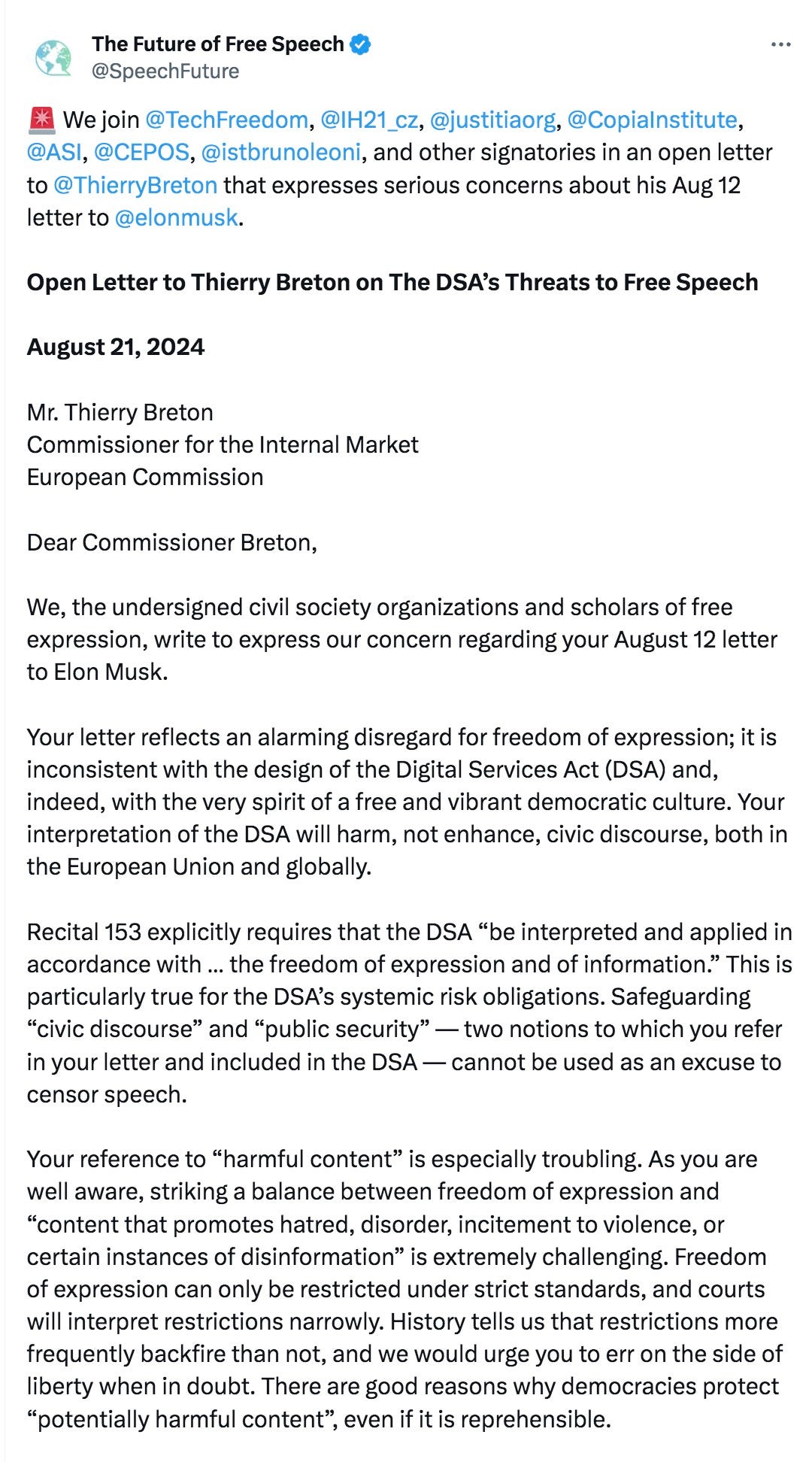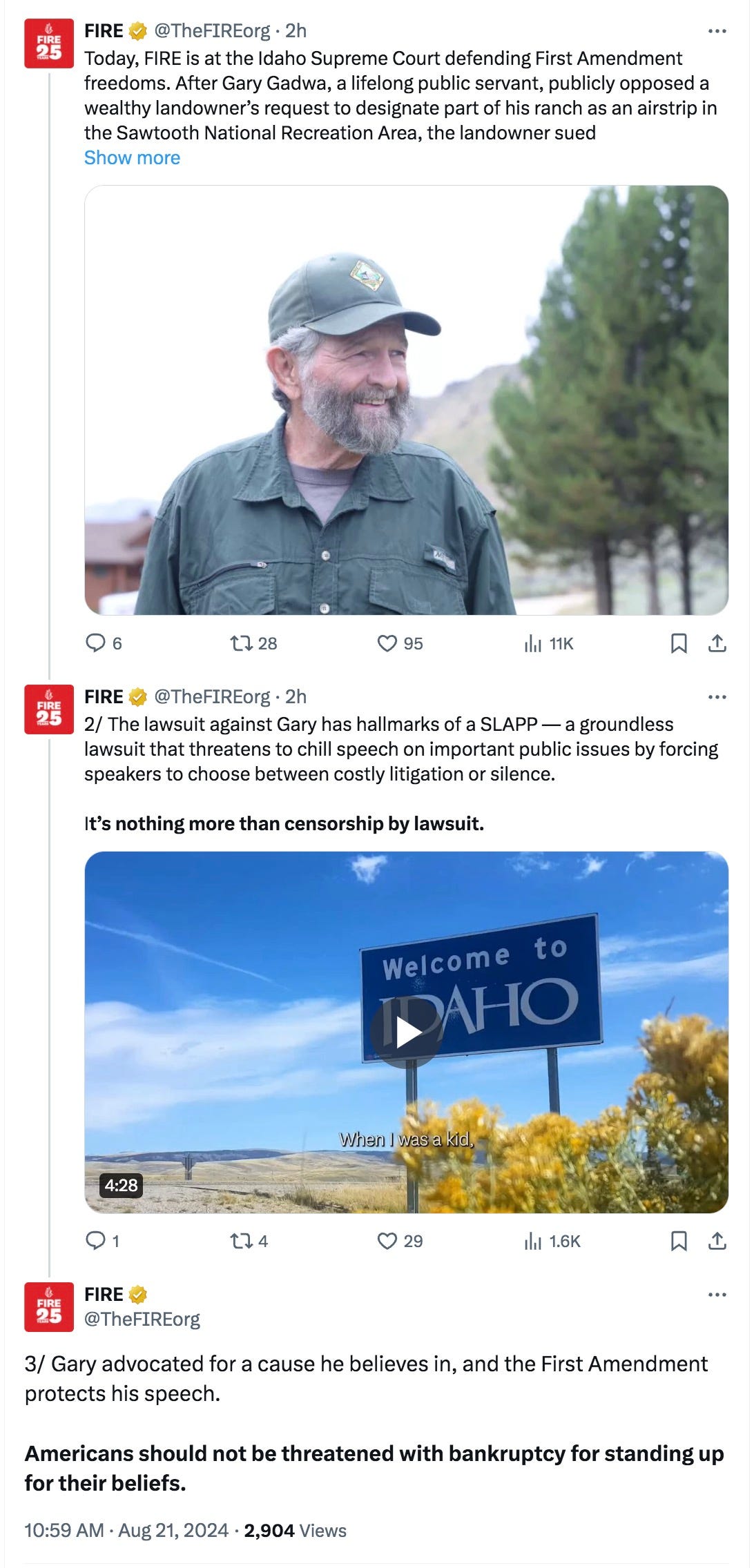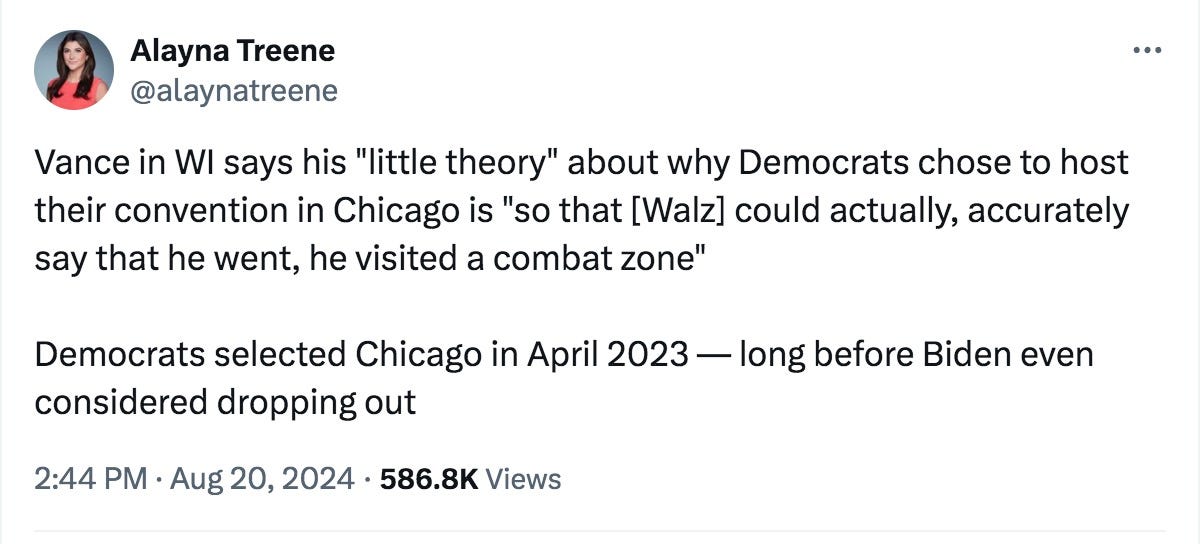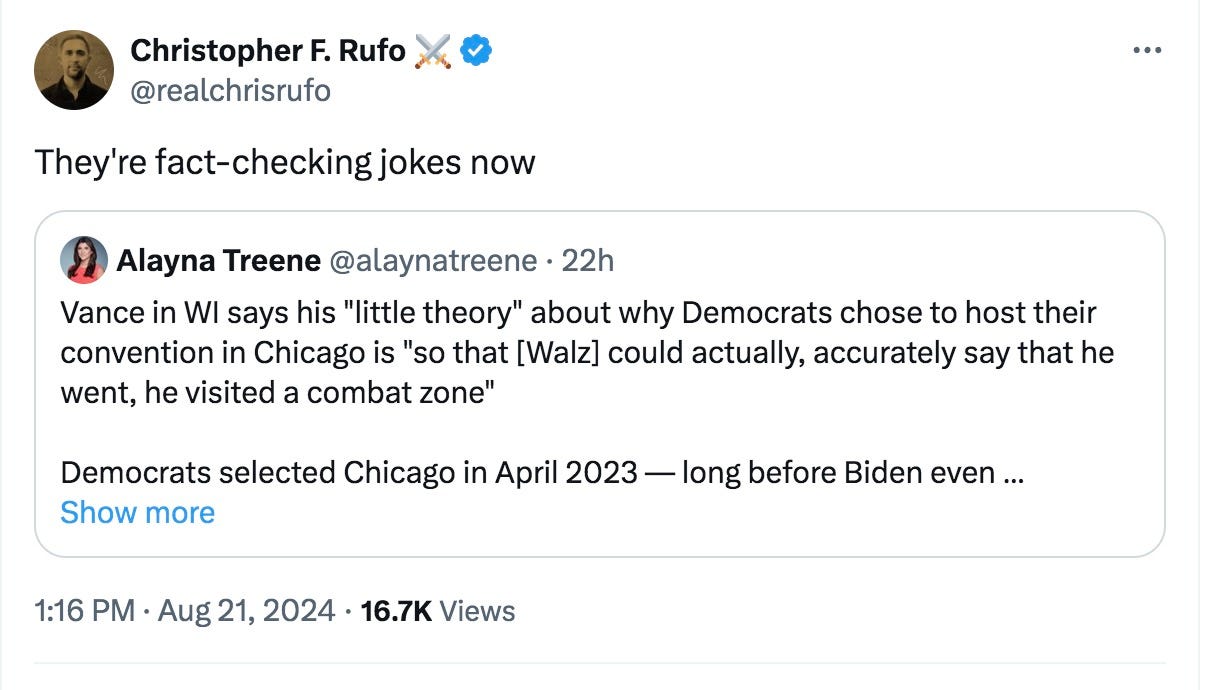E-Pluribus | August 21, 2024
Illiberalism's new intelligentsia; retconning 'settler colonialism'; and a 'media literacy' monopoly in American schools.
A round-up of the latest and best musings on the rise of illiberalism in the public discourse:
Emily Chamlee-Wright: The Bogus Post-Liberal Indictment of Liberalism
Classical liberalism has a diverse group of opponents. At The UnPopulist, Emily Chamlee-Wright writes about one such group of detractors she calls the “post-liberal intelligentsia” (PLI.) While on the surface, Chamlee-Wright says, the PLI might not seem as dangerous as other more violent opponents, their more subtle approach is nevertheless just as sure a path to a more authoritarian future.
[F]ar too few Americans recognize these benefits—equality, material abundance, and social wellbeing—as the fruits of the liberal-democratic project. On both the left and right, many pursue authoritarian politics rather than liberal norms and institutions, as the route to improving their lot. Also worrisome is the surge of illiberal extremism, again, on both the left and right. A recent Reuters/Ipsos poll finds that 68% of Americans are concerned that extremists will engage in violence if the upcoming presidential election doesn’t go their way. While the motivation behind the recent assassination attempt on Donald Trump is not yet known, the fact that it happened reminds us what’s at stake.
As troubling as illiberal extremism is, however, the rising influence of a more erudite illiberal movement—let’s call it the “post-liberal intelligentsia,” or PLI for short—is just as, if not more, concerning.
Among this cast of influencers are self-described post-liberals, Catholic integralists, common good constitutionalists, and nationalist conservatives.
[. . .]
The list of grievances is long. Liberalism’s blind faith in individual liberty and autonomy, they argue, has devastated community and family life by pulling people away from their hometowns, delaying marriage and family formation, and making divorce too easy. Liberalism’s permissiveness has corrupted and stupefied America’s youth, compromised women’s traditional place within society, denigrated the moral status of masculine virtues, and degraded American culture through immigration from the developing world.
Most prominent is the movement’s forthright rejection of progress, which, they argue, has devastated the working class, fueled tyrannical corporate power, and sacrificed American economic interests at the altar of global trade. What’s needed to counteract these forces? According to the PLI, a new elite must emerge, one that sets aside the separation of powers, seizes the administrative state, and flexes its authority to impose political control over the economy and a pre-modern notion of “the common good” as the country’s governing ideal.
If none of this raises alarm, I get it. When we think of threats to an inclusive liberal democracy, we think of angry young men carrying tiki torches, the Proud Boys, and Jan. 6 insurrectionists. The PLI are not these guys. They are smart, bookish, (mostly) polite people with ideas. They do their organizing at conferences in glamorous ballrooms. Some hold endowed chairs at the country’s most prestigious universities. They are people with whom you might strike up a pleasant conversation after religious services or in line at the grocery store.
And that’s exactly the point. As concerned as we should be about the instigators of political violence, elite intellectuals aligned against core liberal principles are far more likely to move the Overton window in a way that accommodates authoritarianism in our day-to-day politics and culture.
[. . .]
PLI critiques often deploy freeze-frame storytelling. These freeze-frame narratives point to something bad happening in the world, tie that bad thing to liberalism’s fondness for individual liberty, and then propose a top-down fix (if they propose a fix at all). Because liberalism is the supposed cause of the problem, the audience is expected to set aside any liberal squeamishness they may harbor, such as concerns about individual rights, constitutional restraint, or market-based reasoning, as the PLI elect impose their conception of the common good.
Freeze-frame narratives are effective in the sense that they put any honest defender of the liberal project into a position of having to concede that (a) problems exist, and (b) solutions can be elusive. But where we agree that a problem does in fact exist, rather than responding apologetically or defensively, liberals ought to ask, “In which system will we have the best prospects of solving the problem?” Freeze-frame storytelling, intentionally or not, has the effect of foreclosing this line of questioning, and keeps us from understanding liberalism as a system that fosters learning.
The liberal promise is not that bad stuff doesn’t happen. Liberalism doesn’t promise that there won’t be economic or social disruption. What it promises is that with liberal norms and institutions in place, free people tend to find solutions. But when we reject liberal principles, workable solutions are much less likely to be found.
Read it all here.
Adam Kirsch: The False Narrative of Settler Colonialism
Criticizing the Israeli government is perfectly reasonable, but many of the country's opponents go far beyond criticism and actually assert that Israel shouldn't exist. One popular line of attack revolves around “settler colonialism,” which is used against the US and other Western nations as well. At The Atlantic, Adam Kirsch explains why this characterization of Israel is pernicious and misguided.
One of the most striking things about the ideology of settler colonialism is the central role played by Israel, which is often paired with the U.S. as the most important example of settler colonialism’s evils. Many Palestinian writers and activists have adopted this terminology. In his 2020 book, The Hundred Years’ War on Palestine, the historian Rashid Khalidi writes that the goal of Zionism was to create a “white European settler colony.” For the Palestinian intellectual Joseph Massad, Israel is a product of “European Jewish Settler-Colonialism,” and the “liberation” referred to in the name of the Palestine Liberation Organization is “liberation from Settler-Colonialism.”
Western activists and academics have leaned heavily on the idea. Opposition to building an oil pipeline under a Sioux reservation was like the Palestinian cause in that it “makes visible the continuum of systems of subjugation and expropriation across liberal democracies and settler-colonial regimes.” When the city of Toronto evicted a homeless encampment from a park, it was like Palestine because both are examples of “ethnic cleansing” and “colonial ‘domicide,’ making Indigenous people homeless on their homelands.” Health problems among Native Americans can be understood in terms of Palestine, because the “hyper-visible Palestine case … provides a unique temporal lens for understanding settler colonial health determinants more broadly.” Pollution, too, can be understood through a Palestinian lens, according to the British organization Friends of the Earth, because Palestine demonstrates that “the world is an unequal place” where “marginalised and vulnerable people bear the brunt of injustice.”
Although Israel fails in obvious ways to fit the model of settler colonialism, it has become the standard reference point because it offers theorists and activists something that the United States does not: a plausible target. It is hard to imagine America or Canada being truly decolonized, with the descendants of the original settlers returning to the countries from which they came and Native peoples reclaiming the land. But armed struggle against Israel has been ongoing since it was founded, and Hamas and its allies still hope to abolish the Jewish state “between the river and the sea.” In the contemporary world, only in Israel can the fight against settler colonialism move from theory to practice.
The concept of settler colonialism was developed in the 1990s by theorists in Australia, Canada, and the U.S., as a way of linking social evils in these countries today—such as climate change, patriarchy, and economic inequality—to their origin in colonial settlement. In the past decade, settler colonialism has become one of the most important concepts in the academic humanities, the subject of hundreds of books and thousands of papers, as well as college courses on topics such as U.S. history, public health, and gender studies.
[. . .]
When modern Zionist settlement in what is now Israel began in the 1880s, Palestine was a province of the Ottoman empire, and after World War I, it was ruled by the British under a mandate from the League of Nations. Far from being “no one’s land,” Jews could settle there only with the permission of an imperial government, and when that permission was withdrawn—as it fatefully was in 1939, when the British sharply limited Jewish immigration on the eve of the Holocaust—they had no recourse. Far from expanding to fill a continent, as in North America and Australia, the state of Israel today is about the size of New Jersey. The language, culture, and religion of the Arab peoples remain overwhelmingly dominant: 76 years after Israel was founded, it is still the only Jewish country in the region, among 22 Arab countries, from Morocco to Iraq.
Most important, the Jewish state did not erase or replace the people already living in Palestine, though it did displace many of them. Here the comparison between European settlement in North America and Jewish settlement in Israel is especially inapt. In the decades after Europeans arrived in Massachusetts, the Native American population of New England declined from about 140,000 to 10,000, by one estimate. In the decades after 1948, the Arab population of historic Palestine more than quintupled, from about 1.4 million to about 7.4 million. The persistence of the conflict in Israel-Palestine is due precisely to the coexistence of two peoples in the same land—as opposed to the classic sites of settler colonialism, where European settlers decimated Native peoples.
[. . .]
[T]he focus on Israel-Palestine isn’t only a product of the discipline’s limitations. It is doctrinal. Academics and activists find adding the Israeli-Palestinian conflict to other causes powerfully energizing, a way to give a local address to a struggle that can otherwise feel all too abstract. The price of collapsing together such different causes, however, is that it inhibits understanding of each individual cause. Any conflict that fails to fit the settler-colonial model must be made to fit.
Read the whole thing.
Oscar Buynevich: Newsela: The ‘Media Literacy’ Provider Active in 90 Percent of American Schools
The danger of icebergs, as the proverb says, is not the part that can be seen. One such potential danger in American education is supplemental material in our children’s schools. At the Foundation for Freedom Online, Oscar Buynevich writes about a relatively new resource, Newsela, used by an overwhelming majority of schools to teach “media literacy.” According to Buynevich, the resources Newsela employs tend to lean left, which will not come as a surprise to most conservatives.
One of the nation’s largest and fastest growing educational technology platforms, Newsela, is also a foremost provider of “media literacy” lessons for schools. The platform started in 2013 has experienced tremendous growth. Its educational products are used in over 90% of schools.
In an educational context, the term “media literacy” is intended to conjure the politically neutral image of educators helping students become more fluent and well-read, but the actual field bears little resemblance to traditional literacy.
Media literacy organizations (including the well-known government-funded media blacklisting organization, NewsGuard), have focused on creating products for educators to teach students not how to read or think critically, but instead teach students what they should read. Media literacy organizations teach which sources and perspectives students ought to trust and which ones should be avoided.
Newsela’s function in the education system revolves around the idea of publishing content from only approved sources. In their own words, Newsela curates material from “trusted sources and makes it instruction ready for ELA, social studies, and science classrooms.” The content from these “trusted” and “vetted” sources is rewritten by their editorial staff to be easily read and interpreted based on a child’s reading level.
These “trusted sources” are exclusively establishment-approved partisan publishers such as The New York Times, Washington Post, Associated Press, and The Guardian. None of Newsela’s over 100 content partners are non-establishment. Even moderate right-of-center outlets like the Wall Street Journal and Fox News are absent.
As detailed in a recent FFO report, Newsela sparked controversy recently due to an undercover investigation by Accuracy in Media, which caught teachers on camera discussing how Newsela could be used to smuggle partisan ideologies like the critical race theory-informed 1619 project into classrooms and teaching assignments against the wishes of parents and state policymakers.
[. . .]
The practice of demanding that Americans only trust and read establishment-approved news sources not only serves partisan animosity towards ideological rivals, but also financially throttles competitors to a legacy industry.
Legacy media like the New York Times and The Guardian face declining readership due to diminishing trust from the public and competition with non-traditional, decentralized media sources. This creates a strong incentive for the establishment to support organizations like NewsGuard, which financially blacklist competing sources while protecting their legacy media competitors.
[. . .]
While Newsela refrains from partnering with right-of-center content partners for material, [Newsela’s editor-in-chief, Jennifer Coogan] made the point that reliable right-of-center sources are too vastly outnumbered by those on the left to create balanced media. She blamed the distrust of “MSM” by the right and a reliance on “social media and personalized feeds” rather than the media industry’s own aversion to anti-establishment viewpoints on this imbalance.
Read it all.
Around Twitter (X)
The Future of Free Speech and other free speech advocacy groups have written an open letter to Thierry Breton of the European Commission with concerns about the EU’s threats to free speech. Click for the whole thing.
The Foundation for Individual Rights & Expression is highlighting a case from Idaho that illustrates how the legal system can be used to silence dissent:
And finally, “fact checking” really has gone too far.










